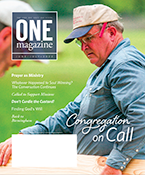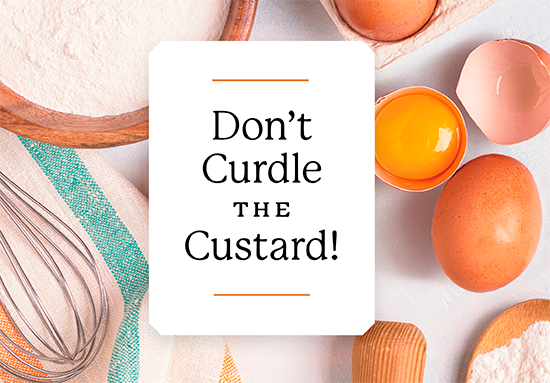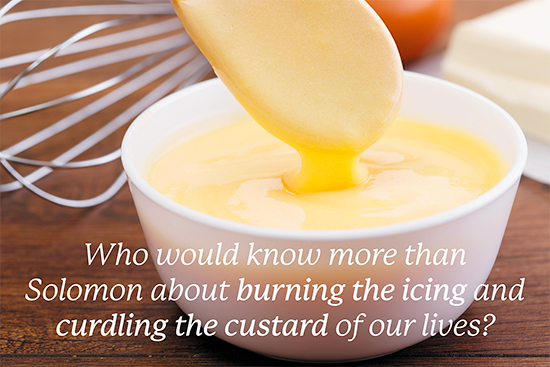
June-July 2022
Congregation on Call
------------------
|





Don't Curdle the Custard
By Brenda J. Evans
Take for instance the caramel icing for her jam cakes. She was patient, went the long route: pour white sugar into an iron skillet, heat to caramelize, and go from there with milk, butter, salt. Take your time, do it well was her unspoken and unwritten precept. Nor did she curdle custards, and puddings, also made in an iron skillet. Her secrets were close attention, well-beaten egg yolks, low heat, and appropriate stirring—little or much as each concoction required. Same thing with meringue—or “calf slobber” as my cousin Bubba called it.
When I asked Mother for her custard and pudding recipes after I married, she said, “I don’t have recipes. You’ll have to watch.”
So, I did, and wrote as she spooned, poured, pinched, and stirred. Sixty years later, I still have a yellowed and splotched 3 by 5 card titled Mama’s Chocolate Pie.
Mother modeled how to avoid curdling the custard and burning the icing. Her unwritten recipes included patience and precision. Don’t rush. Keep heat low. Stir often. Beat egg yolks until pale yellow. Measure carefully—pinch of salt, two palms of flour, two big spoons cocoa, one teacup milk, a hen-egg size hunk of butter. Bake at 350?—her go-to temperature for everything that went into the oven—pies, cakes, casseroles, cornbread dressing, sweet potatoes, Irish potatoes. Always 350?. If different, like for cornbread and biscuits, she told me, and I noted it.
I liked watching Mother create her amazing desserts. She was a master of the art and of the art of living as well. Now that I think about it, she didn’t burn or curdle her long life either (almost 92 years). There were plenty of hard times, complexities, confusions, and time-consuming processes, but she paid attention and faithfully followed the Lord’s rules.
I thought of Solomon the other day when I pulled out Mother’s 60-year-old splotched up chocolate pie recipe. I had recently finished a study of Proverbs and Ecclesiastes. Maybe that’s why. Then our life group studied Solomon’s coronation and reign from 1 Kings. Solomon’s life and writings bore down on me.

From his death bed, David gave his son Solomon a clear recipe for his kingly life. Give heed, Solomon. Be strong. Show yourself a man. Walk in the Lord’s way with all your heart and soul. He might have added, “Stir up your fine brain and warm heart. Turn up the flame for the Lord your God. Mix the Lord’s five ingredients: his charge, statutes, commandments, rules, and testimonies. They will add robust flavor to your life, my son” (2:2-4).
Occasionally as I wrote the recipes, Mother would look me in the eye and say, “Be careful here. Keep the heat low. Pudding is easy to scorch. You don’t want burnt pudding in your pie.” I imagine David adding, “Take care, my son. Don’t swerve from the recipe—keep on The Way Everlasting.”
Solomon began well. His kingdom was firmly established. He asked the Lord for wisdom to rule his people, and the Lord gave wisdom, plus honor and wealth. Solomon set up a governmental order, with officials over every area of his kingdom. He ruled in peace and safety from the Euphrates River to the Mediterranean Sea. He built the Lord’s Temple and dedicated it, then built his own house.
He brought the Ark of the Covenant to Jerusalem. He commissioned storehouses for his goods and cities for his chariots. The word is “whatever Solomon desired,” he built or bought or acquired (1Kings 3-8).
But all’s not well unless it ends well, to misquote Shakespeare. In 1 Kings 9, the Lord revisited Solomon and warned him not to swerve from The Way Everlasting, nor to forget the five crucial ingredients for life. If you walk before me, as David your father walked...I will establish your royal throne over Israel forever…But if you turn aside…Israel will become a proverb and a byword…a heap of ruins. Everyone passing by will be astonished and hiss (9:4-9).
My pecan pie recipe makes the best pecan pie I’ve ever eaten when I do it right. (Guess whose recipe.) I always begin well: measure carefully, dump all the ingredients into a big mixing bowl, turn on the beaters. The directions say, mix well, but don’t whip into a froth. When I ignore or miscalculate, or linger too long with the beaters, a foamy froth swells into a bubbly lather. Even before it’s baked at 305?, I know that what might have been great pie will be ordinary pie. Ignore the recipe; curdle the custard.
By the end of his life, Solomon had ignored David’s long-ago recipe and the Lord’s mandated directions. He burnt and curdled much of his life (1 Kings 11 and 2 Chronicles 9). Consider Ecclesiastes, Solomon’s very personal book that graphically tells the story. (Yes, I say Solomon’s book despite the naysayers.)
Solomon uses “I” seven times in the first chapter and dozens of times thereafter, because Ecclesiastics is a record of his life experiences and his assessment of them. What he did and what he learned—the good, the bad, and sometimes when burnt and curdled, ugly.
For example, who spoke more aptly about money than Solomon (5:10-17), about pleasure, our mouths and hearts, death, reputations, work, fame, and folly. Often, Ecclesiastes is hard to read. It’s a mirror that reflects what I really look like, what I am, or how I’ve failed and strayed from God’s trustworthy recipe for life. How I’ve been foolish or arrogant: experimented, dabbled, grabbed for everything “under the sun.” Things fleshly and enticing and frothy and empty.
“Whatever my eyes desired,” as Solomon said (2:10). Who would know more than Solomon about burning the icing and curdling the custard of our lives? Our self-life, our flagrant violation of God’s laws—His rules, His “recipes” for a good and godly life?
Solomon was wise beyond measure and had knowledge like the “sand on the seashore” (1 Kings 4:29). But he also recognized the vanity, the emptiness of mere human wisdom because he experienced it, according to Ecclesiastes 1:12-18. Solomon forced labor among his own Jewish people and enslaved foreigners to build, store up, and tear down. He took many wives and concubines to his downfall. He gathered beasts, birds, reptiles, and fish; collected 3,000 proverbs; and wrote 1,005 songs (1 Kings 4 and 11). His vast curiosity and acquisitiveness sometimes turned for good, sometimes for evil. And too often, I believe, turned to doing things his way and not God’s.
Ecclesiastes reminds me of the self-focus and “tyranny of things” A. W. Tozer called a “monstrous substitution” for the real and true things of God. Tozer described the self-life of hyphenated sins in The Pursuit of God: self-righteousness, self-sufficiency, self-pity, self- admiration, self-love, on and on. These are demonstrated by our egotism, exhibitionism, and self-promotion. Solomon knew that, said that in his book.
The end of Solomon’s life in 1 Kings and 2 Chronicles is tragic. I hope Solomon repented and turned around. The end of Ecclesiastes says he knew what to do (12:1-8). But did he follow through? Did he come to his senses about whose “life recipe” to follow: remember your Creator, your Maker, your Sustainer, from youth to old age. Abandon the self-life, he says. Did he? I don’t know.
I do know I want to follow the “recipe” in God’s Word, and not curdle the custard of my own life.
About the Author: Brenda Evans lives and writes in Ashland, Kentucky. You may contact her at beejayevans@windstream.net.
|
|

